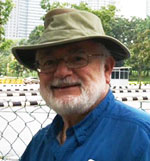
TETON VILLAGE, Wyoming — Like many Americans from March through July, Karen and I were confined to our homes. We saw little of our children and grandchildren. We turned our garage into a makeshift café and entertained socially distanced, masked and with separate serving areas for up to 8 people.
Pandemic junkies follow county, state, national, and international statistics. Nonfiction reading included Black Death works by John Aberth; William McNeill, Plagues and People; and John M. Barry’s study of 1918, The Great Influenza. Friends recommended pandemic fiction about the 1340s, London’s 1666 Plague, and 1918. We tracked conflicting newspapers, radio and television accounts. I presented a one-hour zoom on Pandemics for the Institute for Historical Study.
My 1965 college roommate, deeply interested in Jewish affairs, has a condo in Teton Village, Wyoming. He introduced me to my wife. They had been classmates in Hebrew High School. He was my best man, I was his best man. For the past 12 years we spent Passover there, but not this year. Wyoming for various reasons has been in the lowest national percentile of Coronavirus infection and mortality, 52 in 1 million (actually 30 deaths as Wyoming has a population of 549,914) as compared to New York, California and Nebraska, 1691, 522, and 187 per million, respectively, as of August 16, 2020, according to Worldmeter (no doubt under reported).
The dilemma of how to get there. As intrepid travelers, we flew to London shortly after 9/11. But this time it is different. It is scary to mix with people you don’t know in airplanes and movie houses. We could drive and minimize interaction. “Stop all that” said my friend, “I’ll rent a plane.” He has bigger issues with airplanes, terminals and movie houses than I. A few weeks later we took off from Van Nuys Airport in a two engine, two crew, seven-passenger jet and landed 1 hour 48 minutes later, nose up to nose down, without white knuckles at the Jackson Hole Airport. No TSA, 3 oz liquid or luggage limits.
In the novel Decameron, Giovanni Bocaccio wrote about life in the mid 14th century time of the Black Death. So how do we spend our time in a similar period?
In Wyoming we cooked for 4 to 6 people plus a 4-pound puppy and a 10-pound dog. We do drive by pickup for groceries, and order take out from local restaurants. Wine is replenished by FedEx. We pretty much stay in the house. We take shorts walks, the altitude and terrain impose some limits on distance. I read and write, this is my sixth SDJW story.
I keep the Britta water filter topped off, set the table, empty the dishwasher and the main floor trashcans and play barista and sommelier. Karen has baked a peach and plum galette, and prepared macerated peaches. She zooms Omaha’s Beth El Synagogue for Friday night services and chats with friends. Our granddaughter’s zoom graduation from San Francisco’s Claire Lillienthal School thrilled us. We did a video for an Omaha friends 80th birthday.
We watch Jewish Broadcasting Service television from Israel. There is an abundance of Jewish education programs on Zoom, you just have to figure out the time zones. Yehuda Bauer, 94-years-old, zoomed a Yad Vashem webinar from Israel on genocides in history. The American Society for Yad Vashem Zoomed “A Day of Stolpersteine Dedications.” Jackson Hole’s Chabad House hosted a Zoom presentation by Israel’s Southern California Consul General Hillel Newman. Planned weeks in advance, it took place the day after the announcement of the Israel-United Arab Emirates agreement. Movies of interest included Mr. Jones, about the Stalin-instigated 1933 Ukraine famine, and James Baldwin, I am not your Negro. Our spouses and partners don’t want to partake in depressing subjects and violence; we do join to view The Babysitter Club on NetFlix.
The New Yorker, New York Times, and several Jewish news sources are online. At times we are all looking at our individual screens. We deferred our usual visits to Jackson’s wonderful National Museum of Wildlife Art, drives to Yellowstone, shopping in town, and sampling exciting restaurants and art galleries.
Do I feel guilty? You betcha. Privileged but not entitled, fortunate for parents who turned surviving Holocaust horror to success in America. In the words of Michelle Obama on August 17, 2020, the first day of the Democratic National Convention, we have “lived the promise.”
We are lucky to have been educated, employed and saved for retirement.
Tikun Olam and Tzedakah battles income and racial inequality in our California community, the nation, and the world. We give to the food bank, our synagogues, nonprofit thrift shops, health related and Jewish charitable causes, and volunteer our time where our interests and knowledge converge with community needs. The flood of requests from Bay Area and New York Museums and art organizations and national Jewish scholarly institutions gives me, a bankruptcy practitioner for over three decades, grave concern for after-Covid viability. Pessimism is challenging my normal optimism.
We are whiling away in Wyoming. Shaking hands, hugging, and bussing kisses are out. Much can be accomplished six feet apart via email, texting, cell phones, face time, Facebook, zooming, UPS and FedEx. My daughter-in-law wrote, “You are privileged and you worked hard for this and you know the right person!”
*
Oliver B. Pollak, Ph.D., J.D., a professor emeritus of history at the University of Nebraska Omaha, and a lawyer, is a correspondent now based in Richmond, California. He may be contacted via oliver.pollak@sdjewishworld.com